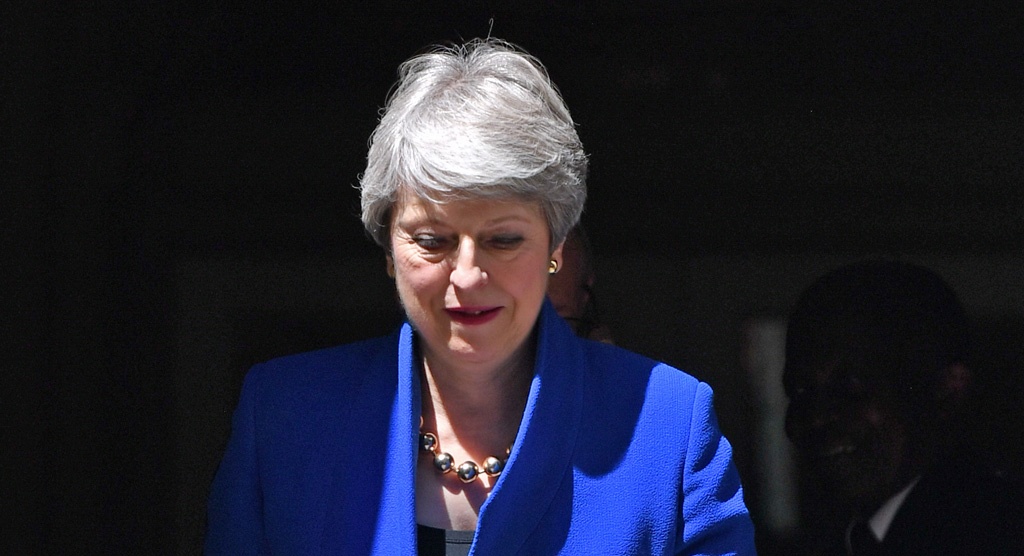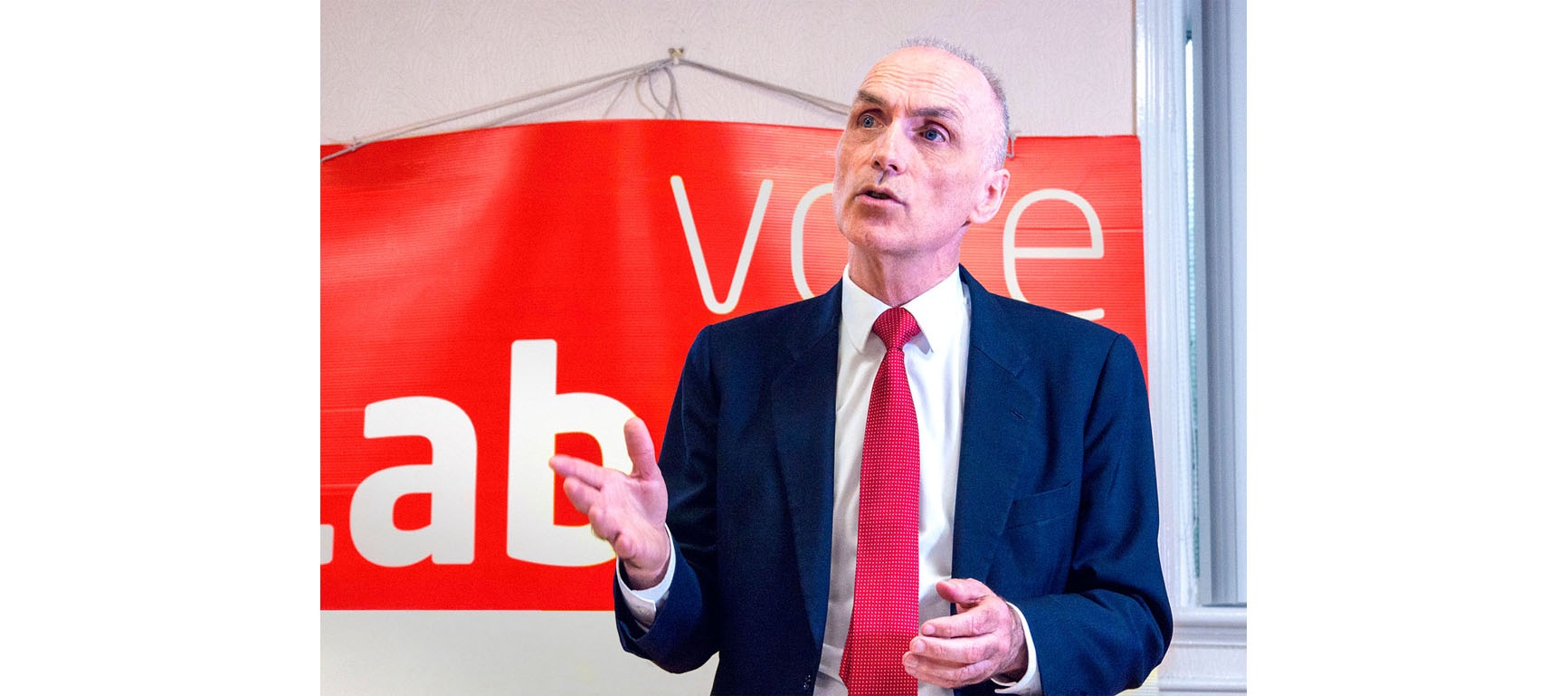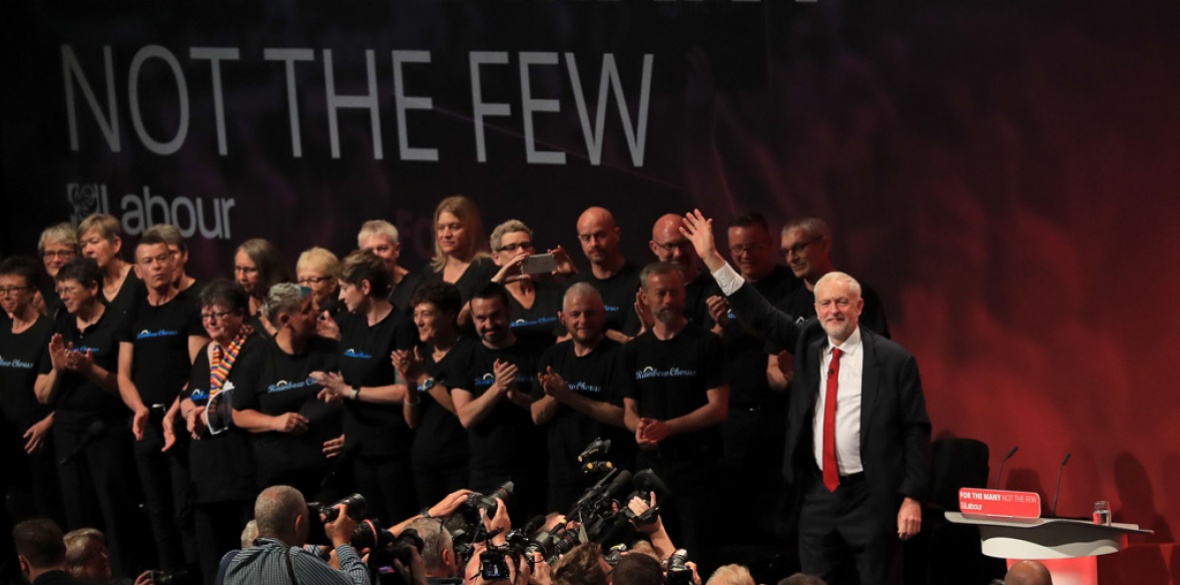This is the last article you can read this month
You can read more article this month
You can read more articles this month
Sorry your limit is up for this month
Reset on:
Please help support the Morning Star by subscribing here
“THIS government believes the people are the masters and votes should be respected. Jeremy Corbyn believes that the people are the servants and politicians can cancel public votes they don’t like.”
“The people are the masters.” As we mark 200 years since the British state sent horsemen to cut down democratic demonstrators in the infamous Peterloo Massacre, Downing Street’s riposte to Labour’s call for a no-confidence vote to stop Boris Johnson shaping a no-deal Brexit shows us what the Tory pitch to voters to see off Jeremy Corbyn’s socialist challenge will be.
The Prime Minister is not known for his honesty and insulting Corbyn is par for the course for elite politicians, pundits and parasites of all kinds.
Labour is undoubtedly right that stopping Johnson before he signs up to any number of toxic trade agreements with Donald Trump’s hard-right US administration is a priority and the unpopularity of a no-deal Brexit in Parliament provides an opportunity to bring his government down sooner than might otherwise be possible.
But the risk is that Johnson’s barb strikes home at a time when anger at Parliament and at anything that smacks of a Westminster stitch-up is running high. Labour’s call for an election aimed at preventing a no-deal exit from the European Union and commitment to back a second referendum with a Remain option could backfire badly if it allows Johnson to unite the Leave vote, delivering him the election victory that eluded Theresa May two years ago.
Jeremy Corbyn and the renewal of British democracy
Johnson’s claim that Corbyn, rather than his own party, is a threat to British democracy is ironic both because Corbyn’s leadership of the Labour Party has expanded the democratic space in our politics and because the Establishment’s response to it has exposed the strict limits to British “democracy.” In the centuries after Peterloo we may have won universal adult suffrage, but the battle for democracy is far from over.
The mere existence of the vote does not mean that governments carry out the people’s will. As others have noted one of the biggest contributions Corbyn’s Labour leadership has made is the return of politics itself, in the form of parties competing for power on the basis of radically different visions for the future. His two sweeping victories in Labour leadership elections and the party’s biggest increase in vote share for 70 years in the 2017 general election exposed a gulf between the “Westminster consensus” and what ordinary people actually think.
Before Corbyn became leader there were years’ worth of polls showing the popularity of certain socialist policies, from renationalisation of the railways to rent controls. This did not stop such policies being dismissed as the preserve of a few outdated cranks by MPs and the press. Whether on public ownership or opposition to war, Corbyn’s Labour has given a parliamentary outlet to currents of opinion that were strong but unrepresented while Labour and the Conservatives sang from the same pro-market and pro-war hymn sheet.
That long twilight saw participation in “official” politics decline. The size of political parties shrank rapidly. As Alex Niven wrote recently in an important Tribune article, Has Labour Lost the North?, Labour was steadily losing votes by the thousand in its heartlands for years before this started to threaten its once overwhelming majorities, and the dramatic social contrast between some of the country’s most working-class constituencies (Hartlepool, Darlington, South Shields, Sedgefield) and their supposed representatives in Westminster (Peter Mandelson, Alan Milburn, David Miliband, Tony Blair) showed Parliament was getting less and less representative of the country it governed.
The explosion in the size of the Labour Party since Corbyn became leader and the huge increases in the majorities of many Labour MPs at the 2017 election showed a reversal of that longstanding trend. The 2017 election itself, the first in many years which saw a party manifesto become a talking point in workplaces up and down the country and which saw legions of new political volunteers swell Labour’s activist ranks, was an exercise in participatory democracy that should have thrilled the politicians of the Blair era (who often lamented the “apathy” of the non-voting public.)
The Establishment Strikes Back
Bliss was it in that dawn to be alive? Sadly not for too many MPs, whose response to the huge influx of new activists was more often fear, hatred and slander rather than the grateful welcome they deserved. The Establishment’s reaction to Corbynism has exposed the myth that the British state is neutral.
A serving general talks of mutiny if the leader of the opposition is elected. Retired spymasters are trotted out to warn that this socialist is a threat to national security — a rich accusation coming from the architects of wars from Iraq to Libya that have empowered terrorists worldwide. Civil servants brief the press about him, a media bombardment of unprecedented ferocity is directed at him, state-funded charities smear him.
In Parliament itself MPs of his own party have sought to overthrow him, kept up a constant stream of misinformation trying to discredit him and screamed blue murder at any suggestion that they be held accountable to their local parties for what they say and do as MPs. The US Secretary of State can be recorded saying Washington will act to stop him becoming Prime Minister — and the Foreign Office was not sufficiently alarmed by this threat of foreign intervention to bother replying to the Morning Star’s requests for comment on the matter.
Corbyn’s project weathered all these attacks pretty well. Though Establishment media crow over any setback, four years into Corbyn’s leadership the party remains far larger than all other political parties in Britain combined. Times headlines jeering that four in 10 party members would prefer another leader ignore the fact that this is more or less in line with his margin of victory in both leadership elections (59.5 per cent in 2015 and 61.8 per cent in 2016). From workplace rights to green energy to regional development and democratic public ownership, Labour is the only major party with a serious policy platform and the only one fizzing with new ideas.

Such is the threat it poses to the powers that be that Theresa May was allowed to limp on in office despite being declared in contempt of the Commons and without the ability to get legislation through the House. Since her resignation, parliamentarians have toyed with anti-democratic proposals aimed at stopping him from becoming PM, from an unelected “national government” that would stop Corbyn and either cancel or revisit Britain’s 2016 vote to leave the EU to Johnson’s idea of “proroguing” Parliament and ruling for a period without it — a proposal worrying in the light of the sustained assault on democratic rights across the channel in France. Emmanuel Macron’s strategy for resolving the crisis of confidence in politics as usual has involved incorporating a draconian state of emergency into permanent law, ruling by decree and deploying savage state violence against the popular demonstrations known as the “gilets jaunes.”
Is the labour movement making progress?
Given the fear they inspire in their enemies, you would expect Labour leftwingers to be brimming with confidence. But they are not. Speak to activists and at constituency party meetings and many clearly feel under siege, daunted by the constant barrage of Establishment hostility, worried by leadership retreats before it and unconvinced the forward momentum of 2015-17 has been maintained.
The party has been driven back from its previous commitment to respect the result of the EU referendum. And Johnson’s calm response to Labour’s invitation to other parties to form a caretaker government suggests that framing the challenge to his government as a bid to stop Brexit happening on October 31 might gift him the perfect narrative to secure victory as the champion of the “people’s vote” that took place three years ago.
Further, emphasising that such a Labour government would restrict itself to postponing Brexit — even though an obvious pitch for the temporary support of parties opposed to the shift in wealth and power to ordinary people that Labour represents — elevates “stopping Brexit” over Labour’s entire transformational programme, a potentially significant political retreat in line with what Labour rightwingers have demanded since 2016.
Though nuances in Labour’s position remain — the party is still committed to seek to negotiate a Brexit that works for ordinary people — these are likely to be drowned out in any election campaign, putting at risk many of the two-thirds of Labour constituencies that voted Leave at the last election and continuing the long-term trend of Labour decline in its heartlands.
The battle for democracy
How should socialists who campaigned to leave the EU respond? The need for a Corbyn-led government sooner rather than later is obvious. Should we fall into line and endorse calls to delay Brexit and hold another referendum?
The problem is that retreats so far have partly been a product of such “message discipline” by Corbyn supporters when enemies of the Labour leader are hindered by no such qualms. Pro-EU Labour MPs have not hesitated to publicly push their agenda and exert constant pressure on the leadership to accommodate their wishes.
Loyalists have instead been careful not to publicly distance themselves from whatever compromise position has been forced on the leadership at the time. The result has been three years in which the powerful case for the left to champion Brexit as an opportunity to free ourselves of an economic bloc that prescribes market economies on all its member states has hardly been heard.
The balance of forces in the parliamentary Labour party is partly responsible for this. Those MPs who are prepared to fight for the Corbyn project have mostly been hauled into shadow cabinet posts. The need for public leftward pressure on the shadow cabinet has been left unaddressed, with the handful of backbenchers loyal to the cause and prepared to help drive that agenda left dangerously exposed, as the right’s successful targeting of Chris Williamson for demonisation and suspension demonstrates.

The answer must surely be for the extraparliamentary movements that first gave birth to the left resurgence to play that role. In this context, the recent launch of the Leave, Fight, Transform (LeFT) campaign for a left exit from the EU is essential.
Corbyn’s best interventions on the Brexit question, such as his 2018 Coventry speech outlining some of the EU’s state aid and competition rules Labour would fight to be free of in negotiations with Brussels, haven’t been followed up because of insufficient movement pressure on Labour to deliver on them. If Labour does wind up in charge of the process, it’s important that these concerns are raised, and the thousands signing up to the LeFT campaign in the days after its launch show the appetite for this initiative is huge.
LeFT can also be vital in assuring Leave-supporting voters that the movement has not abandoned them. Voters aware that the battle for Labour’s soul continues will be less likely to ditch support for the party on Brexit and more inclined to listen when fellow Leave-supporters outline the many important reasons there are for voting Labour beyond the question of our membership of the EU. At the moment Labour’s pitch on all matters related to the EU seems directed exclusively at Remainers, a stance that undermines Corbyn’s passionate defence of the fact that the Leave-Remain divide runs through the middle of the working class when we should be uniting working people against the exploiting class.
LeFT is welcome, but it can only be part of the process of building a more militant extraparliamentary force that provides Labour’s radical leadership with the muscle it lacks in Westminster. Meetings are being held up and down the country with exactly that in mind.
We have ample evidence that the British state — and indeed some of its imperialist allies, most obviously the United States — will do all it can to stop Corbyn entering No 10 and to hobble every aspect of Labour’s agenda thereafter. Winning a Labour government would be a step forwards in the fight for socialism, but it is also becoming a fight for democracy itself, one which requires us to address the unrepresentative character of the British state, including its Parliament. Two hundred years on from Peterloo we need some of the courage and determination that inspired past generations in the fight for democracy.

 Ben Chacko
Ben Chacko









